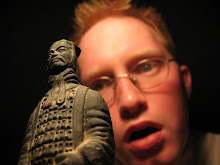Holidays are important in China. In China, adults work long hours. Most students live at their schools and return to see their families only on special occassions... holidays. Holidays allow Chinese people an opportunity to relax and enjoy each other's company. They are treasures, and China cherishes them.
On Mid-Autumn Festival, the headmaster of my school sacrificed his holiday to spend the day with me; I was deeply honored.
We climbed 太白山(TAI BAI SHAN). The translation is "Too Much White Mountain." The name owes to the fact that this mountain is white with snow essentially all year round. The name doesn't translate perfectly though. "Too much white" does NOT signify a tone of complaint--as it sounds in English. In fact, the whiteness of the mountain is what makes it so beautiful, so popular, so sacred.

According to the students who accompanied us, TaiBaiShan boasts a long and significant connection to Chinese history. This mountain has inspired the Chinese people for centuries. Indeed, the students told me that critical developments in Daoist thoughts originated on the mountain. Absorbed in the natural tranquility that surrounded us with every step higher, I too felt inspiration.
I also felt exhaustion! The steps were steep... and never ending... the mountain may have inspired in Zhuangzi enlightenment about the nature of the Way; the mountain inspired in me enlightenment about how grossly out-of-shape I have become.

 Initiall there were steps... an infinity of steep steps... as we climbed higher, we transcended infinity and the steps disappeared in favor of a path worn solid by the feet of the many admirers who had walked this journey before us.
Initiall there were steps... an infinity of steep steps... as we climbed higher, we transcended infinity and the steps disappeared in favor of a path worn solid by the feet of the many admirers who had walked this journey before us.
At various points along our hike ever higher, we came across temples that blended Daoist and Buddhist faith and culture. People lived on the mountains of TaiBaiShan. We stopped at one temple; a woman emerged from a small room to pray for us and wish us blessings. At the highest point that we climbed, we stopped at a temple courtyard and chatted with a man from a distant province who had been living on the mountain for 10 or 11 years. He had formerly been a teacher; now he was something of a hermit. The main was courteous and enjoyed talking, so we stayed a good while. I understood very little of what he said, but I sensed from the others that his stories were very compelling. He was old enough to have lived through the major critical periods of modern Chinese history... I wish I could have asked him a few questions...
One of the temple complexes of TaiBaiShan
retreat from materialism... glimpses of the floating world
Separated by distance and the energy of climbing, the people who live on TaiBaiShan must be self-sufficient for all their daily needs. This mountain-side field of sporadic crops testifies to the extent of their separation from the world below.
We decided to head back. Just in time! My legs were jell-o quickly becoming pudding.
After we returned to the van, we went for lunch at a fantastic restaurant at town near TaiBaiShan. I abandoned my strict, rice-only diet to enjoy the feast. Then we took a stroll through the town toward and a nearby park. After that, we went to a different town and visited a historical site--the school of the famous Song Dynasty neo-Confucian scholar Zhengzai. Finally, we stopped by the headmaster's ancestral home to visit with his mother. The only word in her vocabulary was 吃!(chi = eat) At her numerous and forceful promptings, I ate a handful of grapes, zao, and more mooncake.
TaiBaiShan, good company, great food, and mooncake... a great day... well worth the sore muscles.





No comments:
Post a Comment